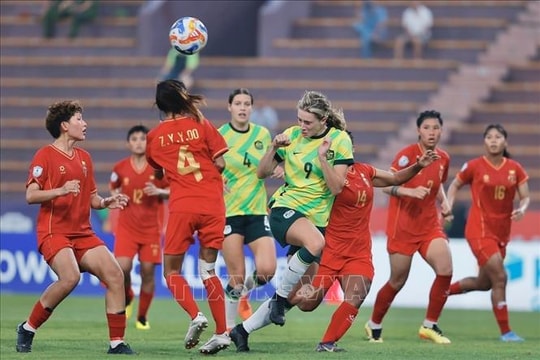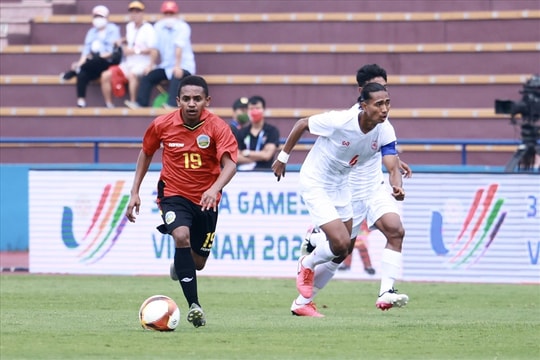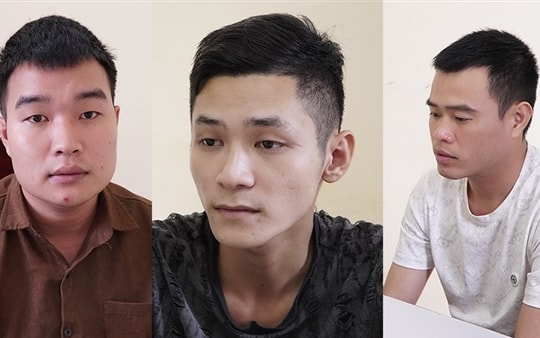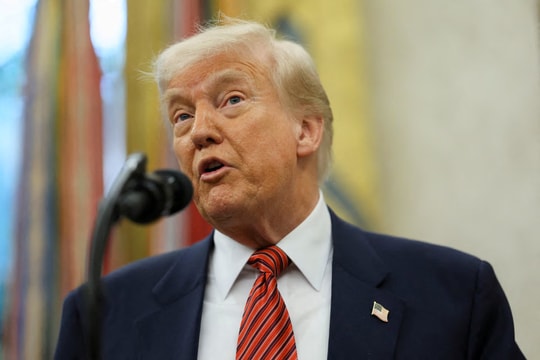Myanmar: What future after the votes?
(Baonghean) - The historic election in Myanmar on November 8th has attracted the entire attention of the international community to this small Southeast Asian country. After 25 years, once again the NLD (National League for Democracy) won, but this time, it was a recognized victory.
Although there are no official results yet, both the opposition NLD and the ruling USDP (Union for Unity and Development) have confirmed the victory of the NLD led by Aung San Suu Kyi. In 1990, Aung San Suu Kyo was placed under house arrest and the NLD's election results were rejected by the current government. Now, USDP leader Htay Oo has spoken out one day after the election: "We have failed and now we need to find out why."
President Thein Sein also pledged to respect the election results. It seems that Myanmar’s ruling party and military have accepted a new page in the country’s history. The question at this post-election moment is: Why did Myanmar’s military accept such an unfavorable result and how will they accept this change?
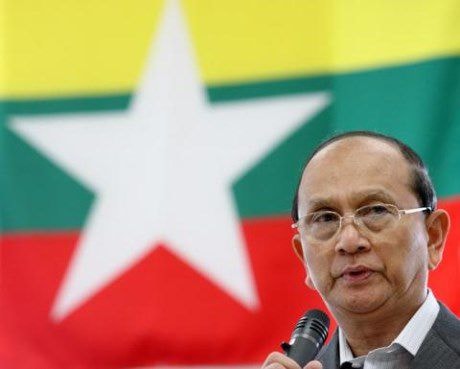 |
| Myanmar President Thein Sein. (Source: Bloomberg) |
The November 8 election was monitored by domestic and foreign observers, including the EU. This was because domestic voters and the international community were skeptical about the transparency of the election process during and after, as the shadow of the previous military regime still loomed large.
Indeed, even if the military regime is abolished and replaced by a transitional civilian state, according to many foreign experts, the Myanmar military still holds the real power to control the country. The military's reaction after the 1990 election when the NLD won is also one of the "black spots" that are difficult to erase when talking about the democratic process in Myanmar.
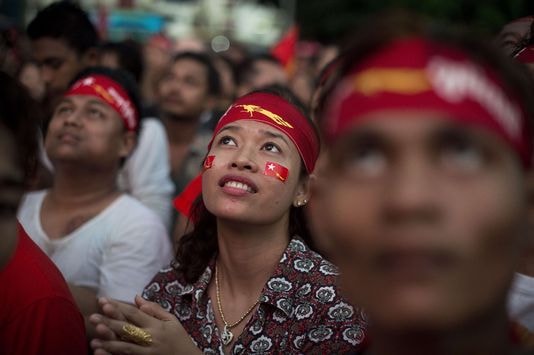 |
| NLD supporters eagerly await the voting results in Rangoon on November 8. (Photo: AFP) |
According to The Irrawaddy, a number of on-the-spot irregularities were discovered. For example, in the Pathein Delta region, voters were offered a sum of money worth about 100 euros if they voted for the USDP; in Kachin State in the north of the country, dead people also appeared on the ballot for a candidate of the National Front for Democracy party;…
US Secretary of State John Kerry pointed to the lack of voting rights for some ethnic minorities, including the Rohingya Muslims in Arakan State, and the disqualification of some candidates. “This election is a significant step forward, but it is far from perfect,” he said.
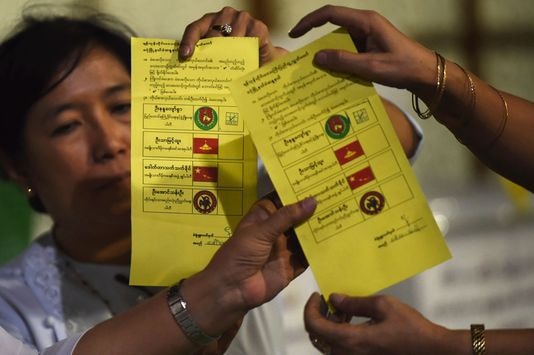 |
| 2 votes for the ruling USDP party. (Photo by AFP) |
However, the overall assessment still holds that the election in Myanmar was conducted in the most open, free and transparent manner possible. In fact, that is also the intention of the current government in Myanmar, for certain reasons. Firstly, this election attracted special attention from the international community, with the appearance and participation of Ms. Aung San Suu Kyi - an international symbol of the struggle for democracy, a strong inspiration for many generations of Myanmar people and especially favored by foreign media. It would be a big mistake if the current government in Myanmar did not "play fair" in the event of an unfavorable result - as they did in 1990, leading to the consequences of strict sanctions, making the country's economy even more difficult on an already extremely complex political and social background.
Second, this election may also be an opportunity for Myanmar to move closer to opening up and being accepted by the international community after decades of sanctions. This should have come true in 2011 when the military government was abolished and political reforms were carried out. But according to the world's assessment, it was just a political gesture of formality.
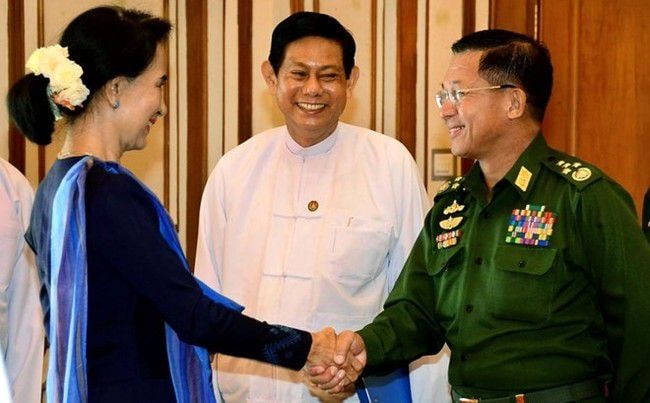 |
| General Min Aung Hlaing congratulates Aung San Suu Kyi on her victory. (Source: EPA/Vtv.vn) |
For the above reasons, up to now, we can record the victory of the NLD and Ms. Aung San Suu Kyi, as well as the current government and the military of Myanmar accepting to transfer part of their power. But will the process of change happen so easily? Although happy with the victory, all NLD supporters and the international community know clearly that 25% of the seats in the National Assembly are by default reserved for generals and officers in the military.
The three key positions of Minister of Border Affairs, Minister of Defense and Minister of Home Affairs will be appointed by the military. Above all, according to the Myanmar Constitution, the highest authority is not the National Assembly but the military's National Security and Defense Council. Field Marshal Than Shwe, who led Myanmar's military government for nearly two decades, is the one who holds the power to control this council.
One of the top priorities of the NLD’s election campaign is constitutional reform, but to do so requires the support of more than 75% of the National Assembly. That is, without the cooperation of the military, it will be extremely difficult to achieve any change. In other words, the democratic process in Myanmar is caught in a paradox: the goal of democracy is reform, change, but it is itself bound by the Constitution established under military rule.
It is also worth mentioning that some provisions were added between 2008 and 2011 when political reforms were carried out. Among them was the ban on citizens married to foreigners from becoming President. That means that Aung San Suu Kyi - the leader of the democracy movement - will not be able to participate in the upcoming election.
There is another factor that could influence the democratic process in Myanmar: China. It is clear that Beijing is not enthusiastic about Myanmar getting rid of sanctions and opening up to the world, especially the West. In addition to improving relations with countries in the region in recent years, Myanmar has also maintained relations with China and received favorable policy support. Clearly, as Myanmar-Western relations improve, Beijing’s exclusive influence in this resource-rich neighbor will no longer be what it once was.
More importantly, the idea of democracy will still be something new in the minds of the people of Myanmar - after decades of military rule and more recently civilian rule with military intervention. Military academies are still the top choice of parents. The power of the military is a reality that Aung San Suu Kyi herself had to admit when asked during her visit to Beijing last June. Surely, Lady Myanmar will have to demonstrate more political intelligence and courage to win more than just votes.
| On November 11, the Union Election Commission of Myanmar continued to update the election results. The NLD is still dominating with 291 seats in the House of Representatives, the Senate and the Regional Legislative Council, while the ruling USDP only won 27 seats. Ms. Aung San Suu Kyi was re-elected as a member of the House of Representatives. |
Thuc Anh
| RELATED NEWS |
|---|

